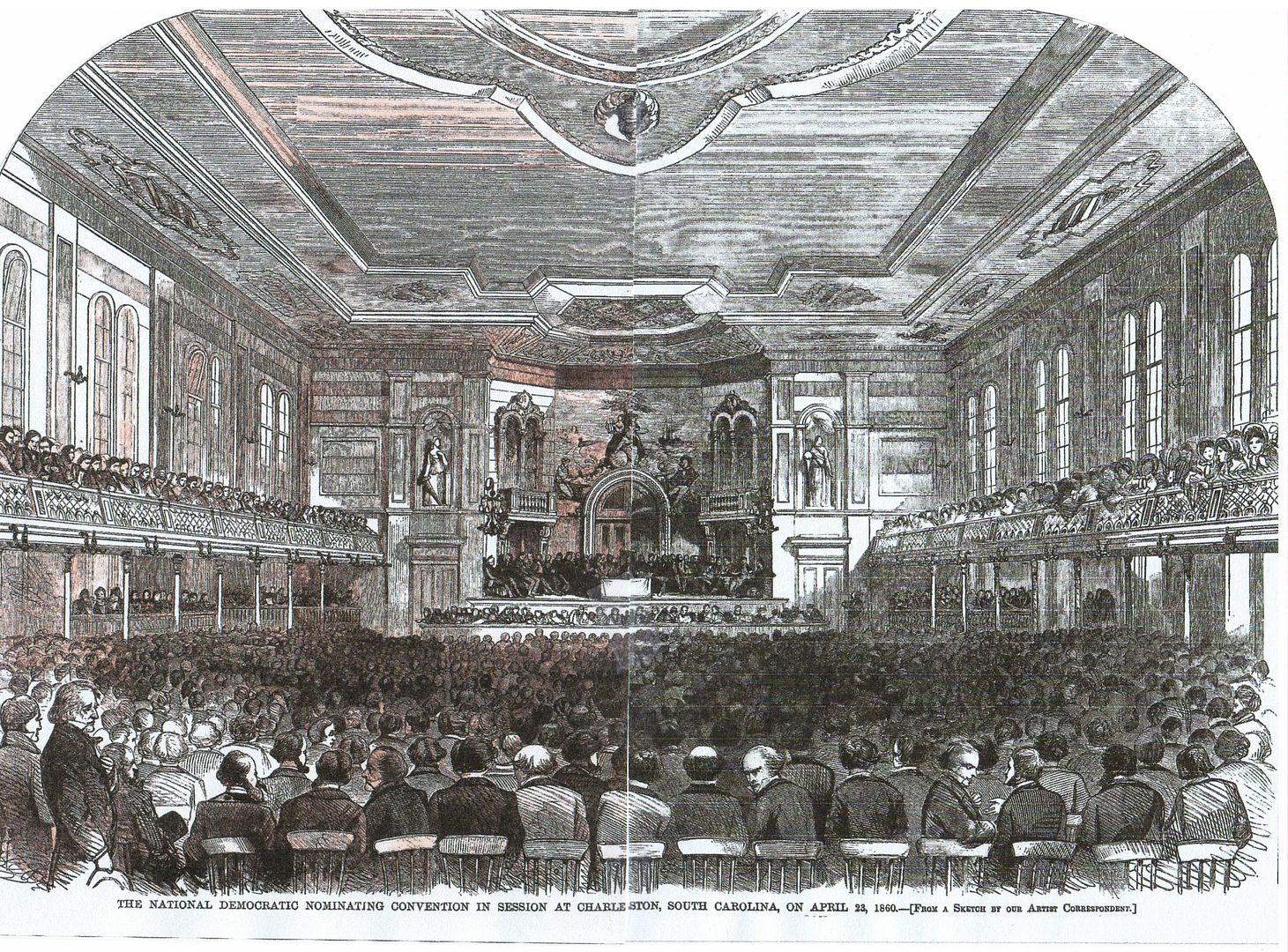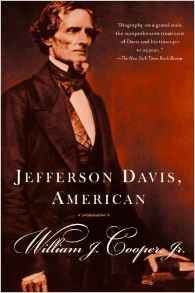
Free Republic University, Department of History presents U.S. History, 1855-1860: Seminar and Discussion Forum
Bleeding Kansas, Dred Scott, Lincoln-Douglas, Harper’s Ferry, the election of 1860, secession – all the events leading up to the Civil War, as seen through news reports of the time and later historical accounts
First session: November 21, 2015. Last date to add: Sometime in the future.
Reading: Self-assigned. Recommendations made and welcomed.
Posting history, in reverse order
To add this class to or drop it from your schedule notify Admissions and Records (Attn: Homer_J_Simpson) by reply or freepmail.
Link to previous thread
To: chajin; henkster; CougarGA7; BroJoeK; central_va; Larry Lucido; wagglebee; Colonel_Flagg; Amagi; ...
Hon. Stephen A. Douglas – 2-4
Editorial: The Approaching Convention – 4
The Lounger – 4-5
On the Way to Charleston, No. III – 5-6
The City of Charleston – 6-7-
Captain Brand of the Schooner “Centipede,” by Lieut. Henry A. Wise, U.S.N. (Harry Gringo). Part I, Chapter VI-VII – 8-10
Written In My Cell – 10-11
Domestic Intelligence – 11-12, 21 (illustration)
Foreign News – 12-13
Presidential Candidates – 14-16
Little Paquette – 16-17
The South Carolina Institute in Which the Democratic Convention is to Meet – 17, 19
A Burning Ship – 17, 20
The Woman in White, by Wilkie Collins, Miss Halcombe’s Narrative Concluded – 17-18
The Narrative of Frederick Fairlie, Esq., of Limmeridge House – 18-19, 21-22
Recognition – 22
At Charleston – 23
2 posted on
04/21/2020 7:16:52 AM PDT by
Homer_J_Simpson
("Every nation gets the government that it deserves." - Joseph de Maistre (1753-1821))
To: chajin; henkster; CougarGA7; BroJoeK; central_va; Larry Lucido; wagglebee; Colonel_Flagg; Amagi; ...
Continued from April 18
(reply #15).

The Diary of George Templeton Strong, Edited by Allan Nevins and Milton Halsey Thomas
3 posted on
04/21/2020 7:18:31 AM PDT by
Homer_J_Simpson
("Every nation gets the government that it deserves." - Joseph de Maistre (1753-1821))
To: chajin; henkster; CougarGA7; BroJoeK; central_va; Larry Lucido; wagglebee; Colonel_Flagg; Amagi; ...
Benjamin F. Butler to Sarah Hildreth Butler, Sunday April 22, 1860 CHARLESTON, S. C., Steamer S.R. SPAULDING, Sunday, April 22, 1860
DEAR SARAH: We came here after a very pleasant passage of from Wednesday at night (6 o'clock) till Friday at 10 P.M. We lay on the quarantine ground till morning, when about 8 o’clock we came up to the city and skirted along its whole length with flags flying, guns firing, and drums beating all in the finest style. Fisher and Clemence were very seasick but are all right now. George was also very sick. For myself, I ate five times a day, slept soundly, smoked incessantly, and drank sparingly. Charleston is much the same apparently that it has been for a half century. Do you remember that the first time I ever spent any considerable hours with you was at the American House, Boston, just previous to your voyage to Charleston? It has occurred to my thoughts more than once. I felt sad at parting from you, but I thought then I should see you again, although you thought not so. You will see by the enclosed prospectus (which I pray you preserve) that I have visited the school at Georgetown. I am more in favor than ever of sending Blanche1 there; you will agree with me when you visit for yourself, as we will do next Winter.
How are all at home? I long to be with you at home again with an inexpressible longing. We shall start probably a week from today and be home in four days. Love to all.
Yours,
BENJ.
_______________
* “I have not read the life of Butler, although I am awaiting it with some curiosity. I read, however, in one of the reviews, of his tribute to his wife. ‘My wife,’ he says, ‘with a devotion quite unparalleled, gave me her support by accompanying me, at my earnest wish, through the War of the Rebellion, and made for me a home wherever I was stationed in command. Returning home with me after I retired to civil and political life, Mrs. Butler remained the same good adviser, educating and guiding her children during their young lives with such skill and success that neither of them ever did an act which caused me serious sorrow or gave the least anxiety on their behalf. . . .
“I had the great honor and pleasure of knowing Mrs. Butler, and this allusion of her husband brings her to mind. I have often thought if I were in the book-writing business that I should sketch a few lives which have come within the range of my own; lives based upon a perfect marriage. That of General Butler should have the first place. His marriage was one of singular felicity. Mrs. Butler was a woman of extraordinary ability, in intellectual force the equal of the General, and that means a great deal; for in mental force Butler is one of the first men of the age. She had more self-command than the General, had a singular grace and dignity, a consciousness of power and genius which attracted you with a sentiment of respect and admiration. She was an exquisite reader, and only surpassed in my knowledge by Fanny Kemble. Shakespeare she knew by heart, and, Mr. Donelly will be pleased to learn, had anticipated him in the acceptance of the Baconian theory. She even believed that the music and the imagination of Shakespeare could be found in Bacon, and I remember her reading, one summer evening at her Washington home, many parallel passages in support of this theory.
“It is not, however, the intellectual side of Mrs. Butler that comes back to me now, thinking of her as I read her husband's tribute to her memory, but her high, serene womanliness. Her power over the General was unbounded. ‘I have never,’ he once said to The Spectator, ‘done anything of any import without taking counsel of my wife, and I have never made a mistake except when I failed to follow her advice. This is high praise. I am proud to write it, as due to a noble and gracious memory. Her influence was always for gentleness, peace, mercy; and how much this must have meant at the side of that proud, turbulent nature. . . .
JOHN RUSSELL YOUNG (The Spectator)
[From the Philadelphia Evening Star, July 18, 1891]
1 His daughter, aged 13, who was at the Georgetown Convent, D.C.
SOURCE: Jessie Ames Marshall, Editor, Private and Official Correspondence of Gen. Benjamin F. Butler During the Period of the Civil War, Volume 1: April 1860 – June 1862, p. 1-2;
civilwarnotebook.blogspot.com
6 posted on
04/22/2020 6:49:25 AM PDT by
Homer_J_Simpson
("Every nation gets the government that it deserves." - Joseph de Maistre (1753-1821))
To: chajin; henkster; CougarGA7; BroJoeK; central_va; Larry Lucido; wagglebee; Colonel_Flagg; Amagi; ...
New source

Bruce Catton, The Coming Fury
15 posted on
04/23/2020 4:35:51 AM PDT by
Homer_J_Simpson
("Every nation gets the government that it deserves." - Joseph de Maistre (1753-1821))
To: chajin; henkster; CougarGA7; BroJoeK; central_va; Larry Lucido; wagglebee; Colonel_Flagg; Amagi; ...

Continued from March 31 (reply #3) .


William J. Cooper, Jr., Jefferson Davis, American
16 posted on
04/23/2020 4:38:05 AM PDT by
Homer_J_Simpson
("Every nation gets the government that it deserves." - Joseph de Maistre (1753-1821))
To: chajin; henkster; CougarGA7; BroJoeK; central_va; Larry Lucido; wagglebee; Colonel_Flagg; Amagi; ...
William H. Seward, April 25, 1860 WASHINGTON, April 25, 1860.
Our telegraphic advices from Charleston favor Douglas to-day. One can hardly realize that the once great Democratic party could be so alarmed as it is now. .
SOURCE: Frederick W. Seward, Seward at Washington: 1846-1861, p. 447
civilwarnotebook.blogspot.com
25 posted on
04/25/2020 6:51:57 AM PDT by
Homer_J_Simpson
("Every nation gets the government that it deserves." - Joseph de Maistre (1753-1821))
To: chajin; henkster; CougarGA7; BroJoeK; central_va; Larry Lucido; wagglebee; Colonel_Flagg; Amagi; ...
Count Adam Gurowski to James S. Pike, Thursday [April 26], 1860 Thursday.
DAMN YANKEE: I lose with you all the cold blood in my veins and all patience. Why misuse, desecrate, the holiest words and conceptions? What for I write books and give to you specially long lectures? Again you speak of the two civilizations. Shame! shame! If you northern wiseacres do not stop such balderdash, I shall be obliged to pitch into you all, and expose your ignorance rivalling that of the South. One of the banditti, Wigfall or Iverson, said in the Senate, “the South will organize a confederacy or government never yet known in the world.” Tell him that he is an ass, as they are all. History knows already, and has recorded a society, community, and government based upon piracy, enslavement, rapine, and slave-traffic. It existed about nineteen hundred years ago for the first time, in Kilikia, or Cilicia, in Asia Minor, and was destroyed by Pompey (not African). Only the Greeks, Romans, Egyptians, Syrians, representants of civilization at that era, called the Kilikians pirates, and not a different state of civilization. How can you make such confusion and offend the civilized Northern villages, operatives, farmers, mechanics? Atone for it. I suggest to you for the next definition to use the expression, two different and opposed to each other social conditions, as piracy is a social condition after all. How much did T. Weed get for his pacificatory article? The South will be amazed to hear soon the terrible thunder and malediction coming from the other side. Already a forerunner arrived in the London Saturday Review, the best and most independent English weekly, and a Tory. It answers to the menaces made previous to the election. It is splendid, vigorous, and going to the bottom. And what will they say when they learn the fact?
The Saturday Review takes, in the name of civilization (there is only one civilization, recollect that), of Europe and of England, the same ground as did the Tribune of November 28th. Guess who wrote it?
My respectful compliments to Mrs. Pike, and my sincere love to my young great favorite, Miss Mary. You are not worthy to have such a daughter. Tell to Sumner that I regret not to have seen him, but that does not interfere with my hearty friendship. .
Good-by. Stand firm, but believe that the going out of the slave or cotton States will not ruin the country or the principles. Quite the contrary. After one or two years of confusion, unavoidable in every transition, the Free States will take a new start, and more grand and brilliant than was the past. A body, politic or animal, to be healthy, to function normally, must throw out the deleterious poison from its vitals.
This is my deliberate conclusion and creed, based on much philosophizing within myself, and looking from all points of view on the thus called secession. Truth, mankind, liberty, civilization, and manhood will be great winners by secession.
Yours,
GUROWSKI.
_______________
* This letter is dated only as “Thursday.” By the fact James S. Pike places this letter between April 16 and May 12, 1860 in his book, and taking into account the speed of the mail, I made an educated guess that the date this letter was written was probably about half way between the two letters mentioned above and Thursday, April 26, 1860 seemed the most appropriate date. But again it is only a guess on my part, purely for purposes of fitting it into my timeline.
SOURCE: James Shepherd Pike, First Blows of the Civil War: The Ten Years of Preliminary Conflict in the United States from 1850 to 1860, p. 514-5
civilwarnotebook.blogspot.com
28 posted on
04/26/2020 6:19:57 AM PDT by
Homer_J_Simpson
("Every nation gets the government that it deserves." - Joseph de Maistre (1753-1821))
FreeRepublic.com is powered by software copyright 2000-2008 John Robinson





